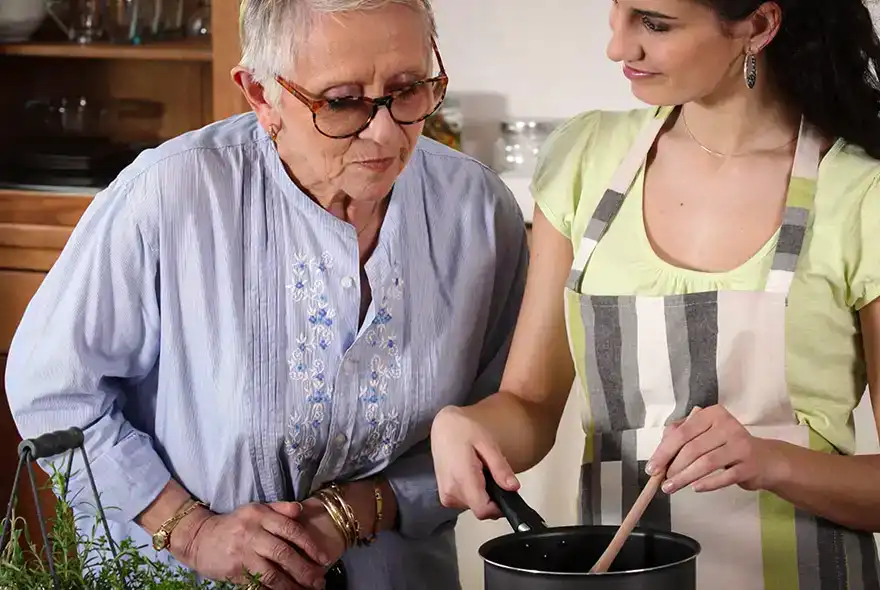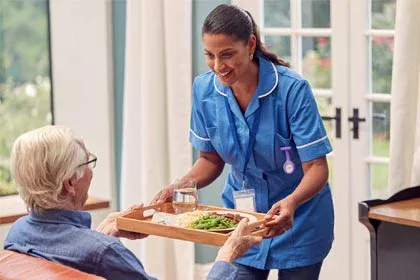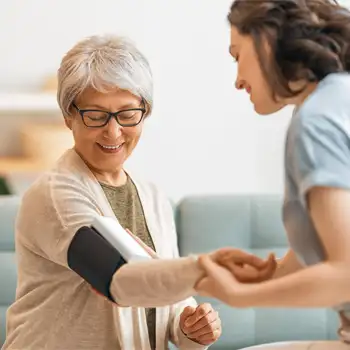As adults grow older, it has been proven beneficial to reside in a setting that is cozy and recognizable. However, maintaining daily household chores can be challenging for elderly individuals and those facing disabilities, restricted movement, or other obstacles.
Allevia Home Care provides skilled and caring staff to assist older individuals or other disabled adults who prefer to continue living in their own homes, even though they might struggle to handle all the maintenance tasks by themselves. A kind-hearted approach involves organizing a care assistant to help with regular duties such as meal preparation, shopping, tidying up, washing clothes, and taking care of the household in general.

What Is Included with Homemaking Services
Homemaker services encompass a range of tasks that can be tailored to meet the specific needs of elderly individuals or those with disabilities within their homes. These services are designed to provide comprehensive assistance with daily tasks and support their independent living. These services not only ensure a clean and organized living space but also foster a sense of companionship and emotional support for seniors or disabled persons who might otherwise feel isolated.
Staff at Allevia Home Care are pleased to provide help with domestic chores that significantly impact the lives of elderly individuals and disabled adults.

These tasks often include:
- Grocery shopping
- Meal preparation
- Kitchen cleaning and organization
- Cleaning and organizing bathrooms
- Vacuuming and sweeping
- Laundry and changing bed linens
- Ironing
- Eliminating tripping hazards and making the home environment safe
- Assistance with pet or plant care
Benefits of Homemaking Services from Allevia Home Care
Allevia Home Care offers a range of domestic help services that can substantially enhance the quality of life of individuals in their own homes.
With a variety of qualified homemakers available for hire across our service area, local residents can benefit from professional-grade domestic assistance scaled to handle their specific household needs.
Allevia Home Care takes pride in building lasting relationships and familiarizing themselves with the nuances of client homes to best pitch in wherever needed. Their supportive presence lets those we serve focus energy on personal priorities rather than allocating multiple hours every week to obligatory home-based chores alone.
Relatives depend on Allevia Home Care to provide dedicated and proficient caregivers who derive genuine pleasure from attending to the small details that enhance the comfort of elderly or disabled individuals.
If you or a loved one are in need of daily assistance, please contact Allevia Home Care to help bring some comfort and peace of mind into the lives of you and your loved ones.
Frequently Asked Questions
What legal options are available for elderly individuals without caregivers?
When an elderly person lacks a designated caregiver, legal options can help ensure their rights and well-being are protected. These options include:
- Guardianship: In situations where an individual is deemed unable to make decisions independently, a court may appoint a legal guardian to act in their best interests.
- Power of Attorney: A legal document granting someone the authority to make decisions on behalf of the elderly person, particularly in financial or healthcare matters.
- Advanced Healthcare Directive: This document outlines an individual’s preferences for medical treatment if they become unable to express their wishes, providing clarity in challenging situations.
What Is The Difference Between In-Home Care And Senior Housing Options Like Assisted Living?
In home care keeps seniors safe in their own homes by providing care either hourly or live-in services. Most seniors would commonly prefer to stay in their own homes for as long as possible. Assisted living facilities are for aging adults who need more care, or need a safer environment. Assisted living facilities are a great option for people who become confused easily and may wander or may need regular medication administration by a med-tech or nurse.
How quickly can Allevia Home Care start care after my initial inquiry?
In most cases we can begin senior care services within 1 week of first contacting our agency. We strive to respond promptly to urgent senior assistance requests.
What regions do you serve for in-home care?
We currently provide caregiver services across Aurora, Denver, Colorado Springs and Counties: Adams, Douglas, El Paso, Elbert, Jefferson.
What Happens If an Elderly Person Has No One to Care for Them?
When elderly individuals find themselves without a caregiver, various support services can step in to provide assistance and ensure their well-being. These services may include:
- Government Assistance Programs: Many governments have social welfare programs designed to support elderly citizens. These programs may offer financial aid, housing assistance, and access to healthcare services.
- Non-Profit Organizations: Numerous non-profit organizations focus on the welfare of the elderly. These organizations often provide services such as meal delivery, transportation, and companionship programs.
- Community Resources: Local communities may offer resources such as senior centers, where the elderly can engage in social activities, receive health check-ups, and access educational programs.
What are the signs that an elderly person is in need of assistance?
Identifying signs that an elderly person requires assistance is crucial for ensuring their safety and well-being. Common indicators include:
- Changes in Physical Health: Keep an eye out for noticeable declines in mobility, changes in weight, or struggles with personal hygiene.
- Social Withdrawal: If an elderly person becomes increasingly isolated, it may signal a need for companionship or assistance with daily activities.
- Neglected Living Environment: A disheveled or unkempt living space may suggest difficulties in managing household tasks, indicating a need for support.

